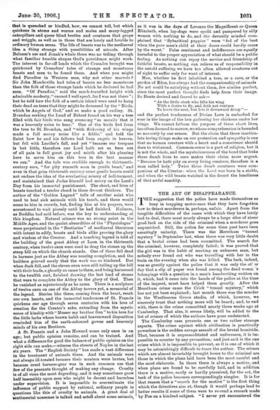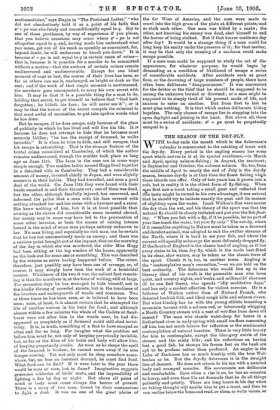THE ART OF DISAPPEARANCE.
THE suggestion that the police have made themselves so busy in trapping motor-cars that they have forgotten bow to detect murderers is, perhaps, unfair. Apart from the tangible difficulties of the cases with which they have lately had to deal, there must nearly always be a large slice of sheer good luck on the side of the criminal when a murderer goes unpunished. Still, the police for some time past have been amazingly unlucky. There was the Merstham "tunnel mystery " in September last, when there was very little doubt that a brutal crime had been committed. The search for the criminal, however, completely failed; it was proved that the girl was in the habit of meeting an unknown man, but nobody ever found out who was travelling with her in the train on the evening when she was killed. The luck, indeed, was so greatly against the police that it was only the of. er day that a slip of paper was found among the dead woma; 'a belongings with a question in a man's handwriting written on it, which, had it come into the hands of the police at the time of the inquest, must have helped them greatly. After the Merstham crime came the Crick " tunnel mystery," which has not yet been explained ; last month there was the murder in the Westbourne Grove studio, of which, however, we sincerely trust that nothing more will be heard; and, to end with, there is the crime committed nearly three weeks ago at Camberley. That also, it seems likely, will be added to the list of crimes of which the authors have gone undetected.
The Camberley case presents one or two rather strange aspects. The crime against which civilisation is practically powerless is the sudden savage assault of the brutal homicide. That, because it is unpremeditated and unforeseen, it is im- possible to counter by any precaution; and just as it is the one crime which it is impossible to prevent, so it is one of which it may be astonishingly difficult to trace the author. The crimes which are almost invariably brought home to the criminal are those in which the plans laid have been the most careful and the most elaborate. In those there is always a motive, and when plans are found to be carefully laid, and in addition there is a motive, easily or hardly perceived, for the act, the task of the police becomes correspondingly simpler. It is for that reason that a " search for the motive " is the first thing which the detectives aim at, though it would perhaps lead to better results if some of them were to re-read a remark made by Poe on a kindred subject. "I never yet encountered the mathematician," says Dupin in "The Purloined Letter," "`who did not clandestinely hold it as a point of his faith that
x' + px was absolutely and unconditionally equal to q. Say to one of these gentlemen, by way of experience if you please, that you believe occasions may occur where z2 + px is not altogether equal to q, and, having made him understand what you mean, get out of his reach as speedily as convenient, for, beyond doubt, he will endeavour to knock you down." It is because e + px is not equal to q in certain cases of crime—
that is, because it is possible for a murder to be committed without a motive—that the authors of certain crimes remain undiscovered and undiscoverable. Except for one blind
moment of rage or lust, the course of their lives has been, so far as others can see it, unchanged, as bright or drab as the
rest; and if the work of that single moment is unwitnessed, the murderer goes unsuspected, to carry his own secret with him. It may be that it is a possible thing for a man to do, holding that secret, to get himself to believe that " God bath forgotten ; he hideth his face ; be will never see it"; or it may be that the horror of the secret compels the criminal to that most awful of necessities, to put into spoken words what he has dono.
But he escapes, if lie does escape, only because of the glare of publicity in which he has lived and will live his life. It is because he does not attempt to hide that he becomes most securely hidden ; " he has the receipt of fernseed, he walks invisible." It is when he tries to hide, and still escapes, that his escape is astonishing. That is the strange feature of the brutal crime" committed at Camberley, of which the author remains undiscovered, though the murder took place as long
ago as June 11th. The facts in the case are in some ways simple enough. Two maiden ladies named Hogg lived together in a detached villa in Camberley. They had a considerable amount of money, invested chiefly in Japan, and were slightly eccentric in their habits. They had travelled, and seen a good deal of the world. On June 11th they were found with their heads smashed in and their throats cut; one of them was dead, but the other, although fearfully injured, has recovered, and informed the police that a man with his face covered with netting attacked her and her sister with a hammer and a razor. She knew nothing of him, but it is at least possible that. owning as the sisters did considerable sums invested abroad, her money may in some way have led to the provocation of some other investor, or been the means of raising intense hatred in the mind of some man perhaps entirely unknown to her. No man living, and especially no rich man, can be certain that he has not unconsciously made an enemy; and there was a curious point brought out at the inquest, that on the morning of the day in which she was murdered, the elder Miss Hogg bad been sitting at the top window of the house, apparently on the look-out for some one or something. This was described by the witness as never having happened before. The crime, therefore, just possibly may have been one of revenge, or, of course, it may simply have been the work of a homicidal maniac. Whichever of the two it was, the salient fact remain- ing is that the murderer is, at the time of writing, still at large. For seventeen days be has managed to hide himself, not in the kindly throng of crowded streets, but in the loneliness of the bracken and undergrowth of woods and commons. Two or three times he has been seen, or is believed to have been seen ; once, at least, it is almost certain that he attempted the life of another woman in his hunt for food ; and although almost within a few minutes the whole of the Cadets at Sand- 'burst were out after "him in the woods near, he had dis- appeared as completely as if fernseed could still shed invisi-
• bility. It is, in truth, something of a feat to have escaped so often and for so long. For imagine what the problem set 'before him must be, not only of keeping perpetually invisible, but, so far as the fibre of his brain and body will allow him, of keeping perpetually awake. As soon as he sleeps the spell of the fernseed is broken ; be cannot move away if be sees 'danger coming. Yet not only must he sleep somehow some- where, but, no less an insistent demand, he must find food.
• What food can he find ? If it were later in the year there would be nuts or corn, but in June? Imagination suggests gruesome robberies of birds' nests, and the impossibility of lighting a fire by day or night. But above all pain's of mind or body must come always the horror of pursuit. There is a story of two men,• forced by tLeir companions 'to fight a duel. It was On one of the great • plains of • the far West of America, and the men were made to crawl into the high grass of the plain at different p'oints,•aud so stalk each other. One man was killed by a snake; the other, not knowing his enemy was dead, shot himself to end the horror of being stalked. But if that horror continues day after day? It would be a strange thing if a man could for long keep his sanity under the pressure of it ; for that matter, it may be that only the cunning of a madman could make escape possible.
If a sane man could be supposed to study the art of dis- appearance, for whatever purpose, he would begin by demanding as a condition of likelihood of escape a series of considerable accidents. After accidents such as" great fires, or the drowning of large numbers of people, there have often been deliberate "disappearances." It was convenient for the debtor or the thief that he should be supposed to be among the unknown burned or drowned ; or a man might be supposed to be simply tired of his present mode of life, and anxious to enter on another. But from first to last he must plan nothing. It is that which makes deliberate hiding hopeless. The only chance of escape lies in stepping into the open daylight and joining in the hunt. But above all, there must be a series of accidents: as + px must be perpetually unequal to q.



























































 Previous page
Previous page